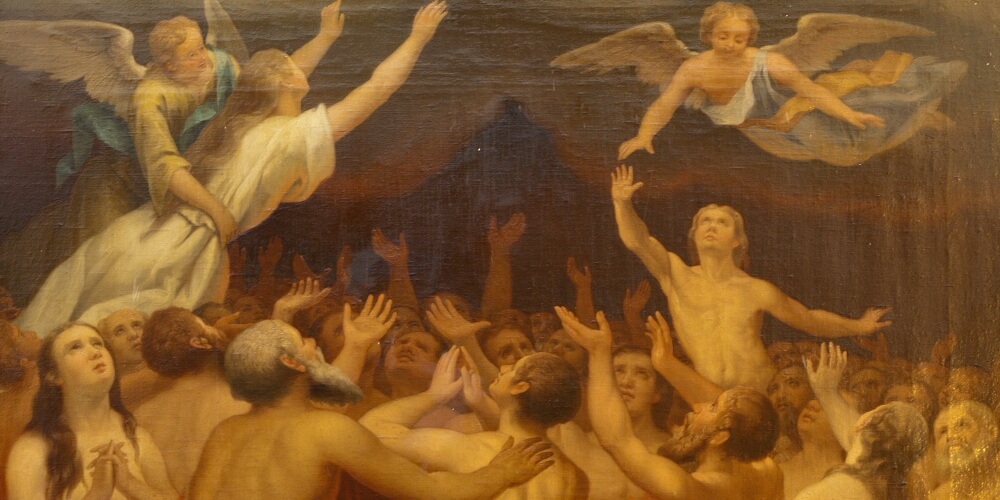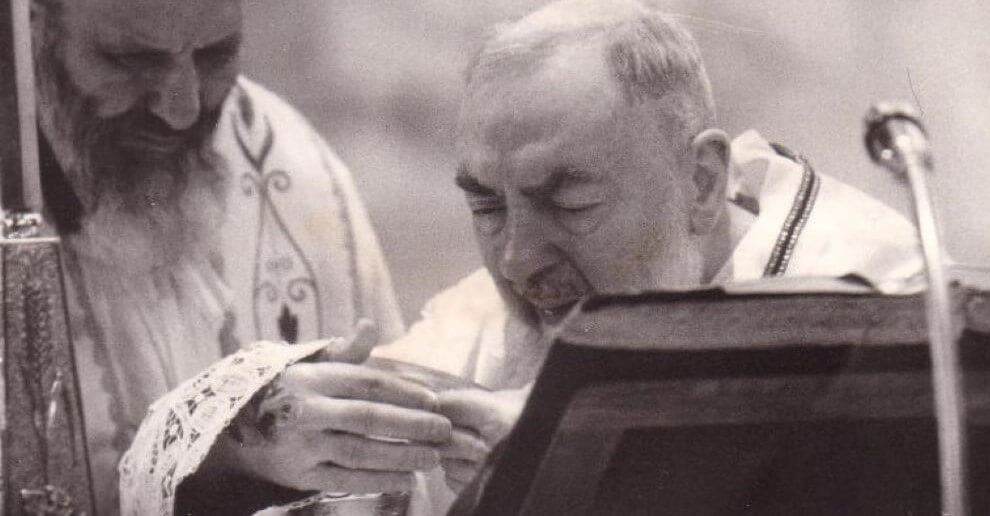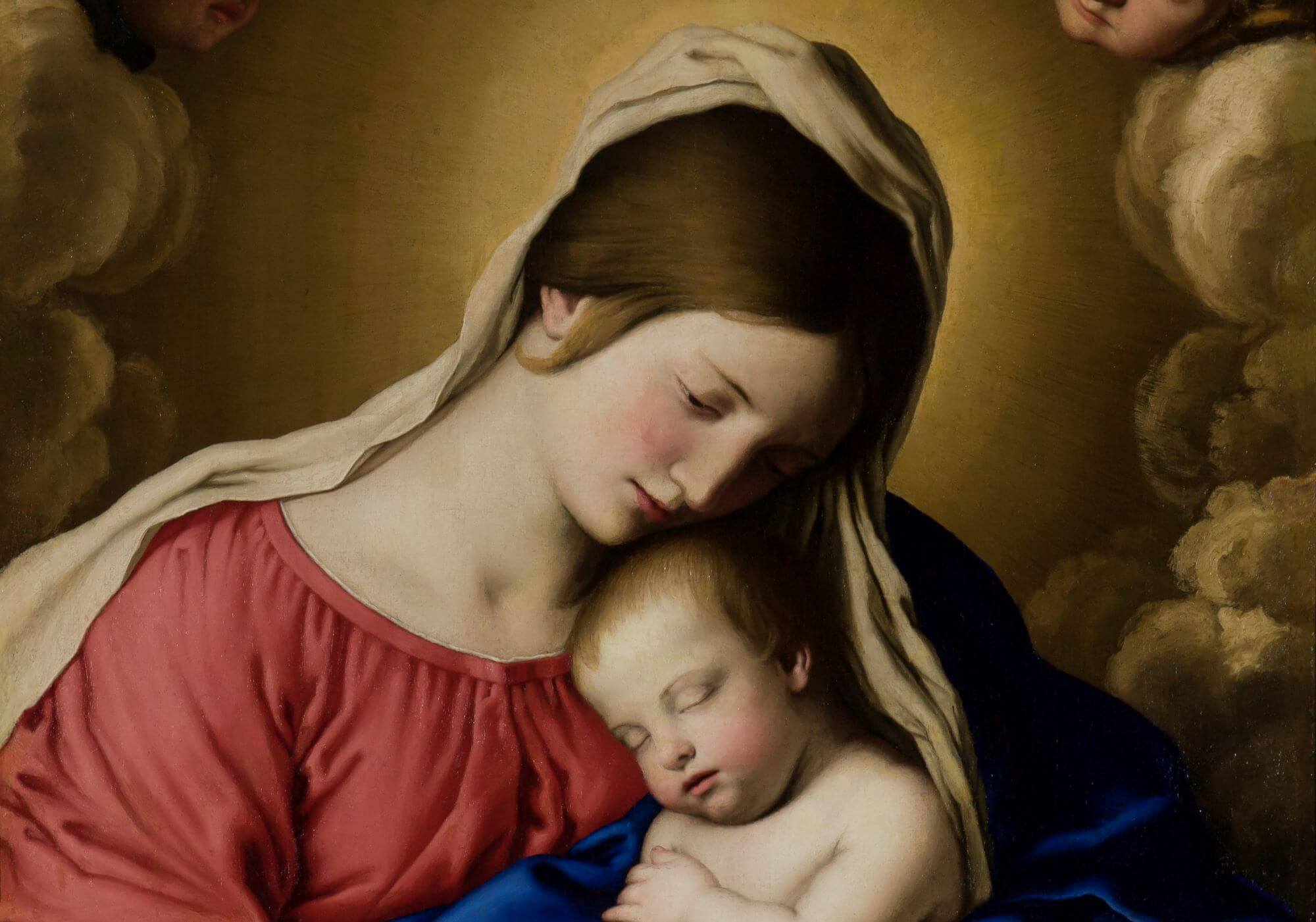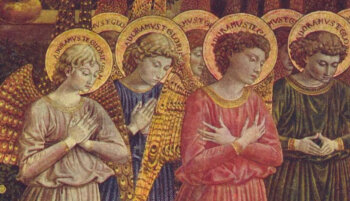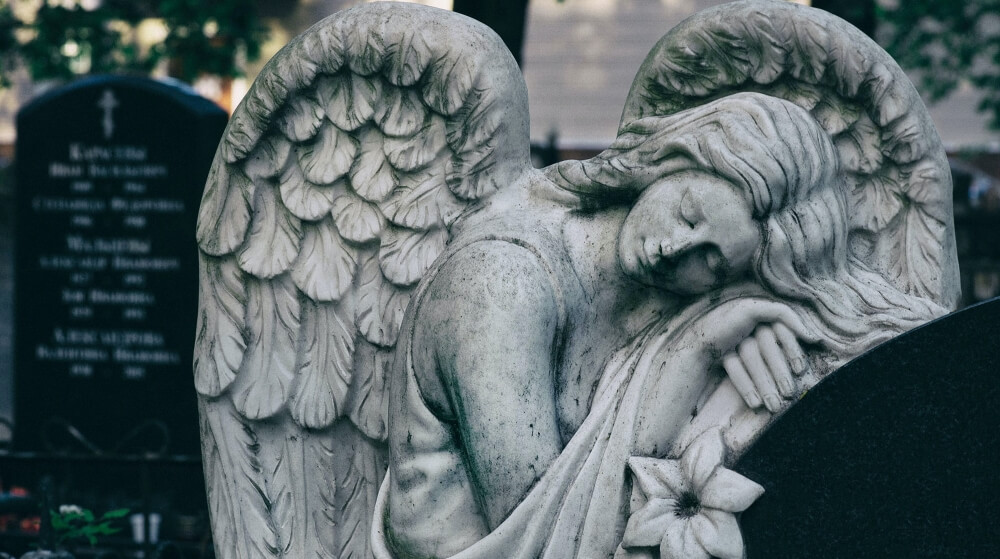
There is an unfortunate trepidation associated with cemeteries.
Many people (including devout Christians!) are depressed to walk in them by day and frightened of going near them at night.
This is a form of superstition that isn’t supported by a Catholic understanding of the invisible world. In fact, we miss a beautiful opportunity when we indulge in this fear.
Why? Because cemeteries are a visual call to prayer. They remind us of the souls who have gone before us—men and women who don’t want to be forgotten anymore than we do.
Now if the persons whose mortal remains are buried in the nearby cemetery are in heaven, they are not in need of prayer and sacrifice; if they are in hell, they are beyond such help; but if they are not in heaven or hell, we have a duty and the ability to offer them aid.
What is purgatory, really? What is happening to the souls there? What do they experience? What can we do to help them?
Here are some answers.
What is Purgatory?
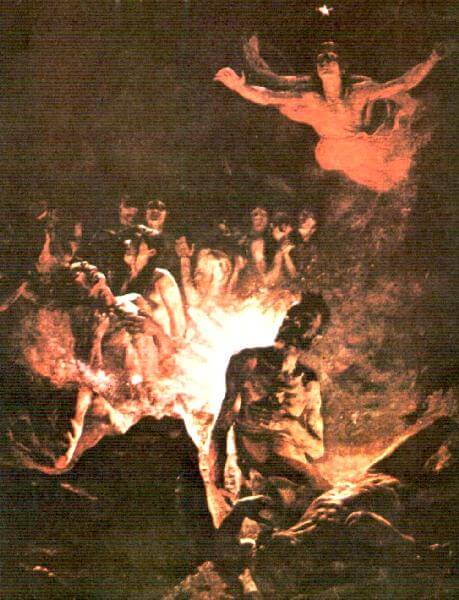
The Catechism provides a simple definition of purgatory:
All who die in God’s grace and friendship, but still imperfectly purified, are indeed assured of their eternal salvation; but after death they undergo purification, so as to achieve the holiness necessary to enter the joy of heaven.
The Church gives the name Purgatory to this final purification of the elect…
Catechism of the Catholic Church 1030-1031
According to the writings and visions of countless saints and theologians, most people who die in a state of grace are not yet fully purified. Their souls are not ready to see God face-to-face or to embrace perfect union with Him.
St. Teresa of Avila, who saw an astonishing number of visions of deceased souls, said: “[A]mong all souls I have seen, there are only three who totally escaped purgatory.”
It seems, then, that most people who die in a state of grace do not go directly to heaven, but rather undergo a period of purification that accords with the precise state of their souls.
The pain of these souls—which is usually described as a cleansing fire—seems to have one source:
[The soul’s] encounter with God right after death has wounded it with an intense pining for Him, whom it has for a fleeting moment recognized as the ultimate fulfillment of all its longings, wishes, and hopes, of its craving for happiness…having seen Him, the torment of being far from Him surpasses any feeling of being banished from the beloved things one knew on earth.
Gerard van den Aardweg, Ph.D., Hungry Souls
The souls in purgatory are called “holy” because they can sin no more and are guaranteed to enter heaven eventually; they are called “poor” because they cannot help themselves in their current state and can do nothing to lessen its pain or duration.
Instead, they are dependent on the prayers of others to relieve their suffering and hasten their purification.
Visitations from Purgatory

The “invisibility” of the spiritual realm can make it seem as though there were a clear divide between it and our everyday life, or what we call “reality.” We forget that our five senses are designed to apprehend material things; we do not naturally have the faculties to apprehend spiritual realities. When, according to God’s will, spiritual beings such as angels appear, they must take on an appearance that is perceivable to our sense of sight.
In a similar way, the souls of the deceased have been permitted to appear to mankind. Such apparitions have been recorded for thousands of years. It is a mystery why God allows certain souls to seek spiritual aid, and why some people among the living—though very few—are able to communicate with them. We must trust His provident will.
Such visitations are very rare but follow a pattern. For example, these souls usually seek out saintly men and women whose holiness can benefit them spiritually. When the soul’s purification is complete, or when their helper has given all the assistance that they are able, the visits cease.
The poor souls, despite being separated from their bodies, display “recognizable characteristics of the face and body that they animated during earthly life—and with which they will be united on the day of general judgment,” writes Dr. Gerard van den Aardweg.
There are other kinds of apparitions as well. It seems that departed souls can appear in certain places without the intention of visiting someone. St. Thomas Aquinas was able to infer (through the study of trustworthy apparitions) that some poor souls undergo their purification here on earth. “This may account,” writes Dr. van den Aardweg, for certain claims of “recurrent apparitions of departed persons on certain fixed places [such as where they lived] or the site of their sins.”
And that brings us to the question of ghosts.
Are There Such Things as Ghosts?
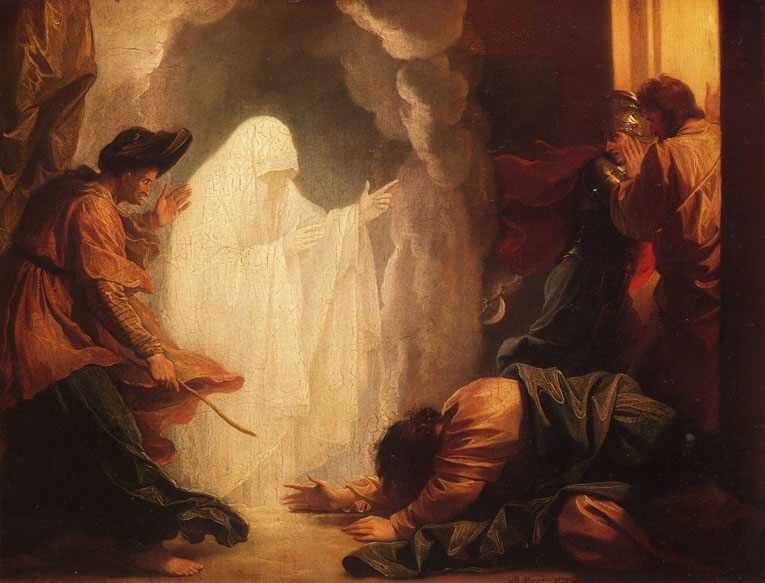
Most readers, by this point, will have a question hovering in their minds: “Does this mean that there really are ghosts? Are documented ghost sightings actually apparitions of souls in purgatory?”
The word “ghost” has so many connotations that we need to strip it down to its original meaning before we can answer that question. It comes from an Old English word, geist, which means “spirit.”
Ghosts, properly understood, are disembodied souls, and disembodied souls belong to human beings who have died—since death results when the soul separates from the body.
The Catholic Church has not offered an official teaching on the subject of ghosts, although her theologians have discussed the matter for centuries. St. Thomas Aquinas had this to say:
…according to the disposition of divine providence, separated souls sometimes come forth from their abode and appear to men . . . It is also credible that this may occur sometimes to the [souls of the] damned, and that for man’s instruction and intimidation they be permitted to appear to the living.
So yes, it seems that what people call “ghosts” are departed souls. (Also note St. Thomas’s point that the “damned” may appear “for man’s instruction”; God doesn’t permit apparitions for mere entertainment.)
Of course, not every claim of ghostly activity is genuine. Most paranormal reports can be attributed to natural causes.
Furthermore, demons are capable of pretending to be departed souls; so not all “ghosts” are from purgatory.
Some apparitions that present themselves as souls of the dead may indeed turn out to be demons in disguise, seeking to deceive the credulous…[S]o-called manifestations of the dead during…magic or occult sessions…are by no means the departed persons they pretend to be, but hoaxes or demonic imposters.
Gerard J. M. van den Aardweg, Ph.D., Hungry Souls
In this clip from Angels and the Supernatural, Fr. Matthew Kauth shares a rather haunting story about the reality of purgatory and a ghostly apparition:
Recorded Accounts of Purgatory Apparitions
The relationship between poor souls and the devout persons they visit is a beautiful example of the Communion of Saints in action. It affirms the unexpected ways in which God works.
We’ll focus on one particular example. Eugenie von der Leyen (1867–1929) was a holy woman chosen by God to be a source of grace for those in purgatory. She had many encounters with the faithful departed, all of whom were in varying stages of purification. Her interaction with them was generally kept secret.
[Eugenie was an] emotionally stable, amiable, cheerful, and realistic woman…Everyone liked her, especially the children. [Her family was] of high German nobility…By order of her confessor, she kept a sober and matter-of-fact diary of her contacts with the poor souls, which after her death was handed over to Eugenio Pacelli, the later Pope Pius XII…
Gerard J. M. van den Aardweg, Ph.D., Hungry Souls
As seems to be common with such apparitions, souls that appeared to her were not clearly visible at first; but as prayers and sacrifices were offered, and their purification advanced, the features of their faces became more recognizable.
Here is an example from her diary, recounting an experience with the soul of a Dominican religious who came to her. It was several days before she recognized him.
September, 5. …face was still wholly unrecognizable, a grey lump. He is rather quiet, but mutters incomprehensible words, it seems Latin.
September, 10. The Dominican is not frightening, but very often around.
September, 13. The Dominican is a father I have known well, a Frenchman. Was a long time with me, nodded assent when I started praying.
September, 17. I was very sad about something this night and cried. Then a hand was laid on my head. I looked up, it was the Dominican. He said: “Why do you weep?” I: “Because I am not content with myself.” …He: “Have confidence and be humble!” I: “How can I help you then?” He: “By mortification.”
Eugenie, courageous woman that she was, also received visits from souls who died in so bad a spiritual state that they required intense purification. Their appearance was so disturbing and unattractive that they could have been mistaken for damned souls.
Her diary entries show how exhausting this work of mercy can be and that the more she gave herself to the poor souls, the more there were who desperately clung to her and pressed her to give everything she had. If we realize that God is behind all [genuine] apparitions of souls, the conclusion must be that He is so eager to release the suffering souls that He allowed them nearly to force [her] to consume her powers in their service. But from her diary it also transpires that she herself became more holy, more purified, selfless, in the process; God’s grace is multifunctional.
Gerard J. M. van den Aardweg, Ph.D., Hungry Souls
How Can We Help the Poor Souls?

Now that we better understand the suffering of the poor souls, what can we do to help them? Doing so is a great act of charity. It benefits our own souls, as well.
Our prayer for them is capable not only of helping them, but also of making their intercession for us effective.
The Catechism of the Catholic Church 958
Here are some ways in which we can offer spiritual aid through the mercy of God:
1. Arrange to have Masses said for the holy souls. Requests from souls in purgatory have affirmed that the Mass is the most powerful prayer that can be offered on their behalf.
2. Pray for the holy souls. When someone dies, we should not assume that they are in heaven, even if they were “a very good person.” We should commence praying them for them immediately. Pray the Rosary, especially. We are told that invoking Our Lady’s intercession under her title of “The Immaculate Conception” can lead to a particular outpouring of grace for the Poor Souls.
3. Offer sacrifices, alms, and mortifications. Even the smallest hidden sacrifice benefits them immediately, according to the testimony of a soul in purgatory.
4. Offer your ordinary daily work for the poor souls. Unite your activities with the Sacred Heart of Jesus, which has been taught to be meritorious for the holy souls. Do your work cheerfully and well.
Now that we have learned about the souls in purgatory and the charity that we can offer them, let’s conclude by praying this traditional prayer for the Holy Souls:
O most gentle Heart of Jesus, ever present in the Blessed Sacrament, ever consumed with burning love for the poor captive souls in purgatory, have mercy on the souls of Thy departed servants. Be not severe in Thy judgments, but let some drops of Thy Precious Blood fall upon the devouring flames. And do Thou, O merciful Savior, send Thy holy angels to conduct them to a place of refreshment, light, and peace. Amen.
This article was taken from the fascinating series Angels and the Supernatural. This digital online course has transformed the lives of Catholics who want to understand the invisible world better: ghosts, demons, angels, and more. You can sign up here and take the journey yourself.
Subscriber reviews for
Angels and the Supernatural:

“I am completely fascinated with
this series. I now say prayers and
rosaries for souls in purgatory.”
“Keeps your interest level
at an all time high!”
“Outstanding.”
“Each daily lesson was enlightening.
I thought I knew and had sufficient
knowledge about the supernatural
but I was woefully wrong.”
“Taught me things I did not know, even
after 16 years of Catholic education.”
“I am learning so much about our
Angels and I love listening to
Fr. Kauth’s explanations.”
“Perfect format for a busy Mom. Content excellent!”
“I love this course….now I have a more clear vision
of all angels…down to earth and easy to understand.”
“Of all the presenters in the various series,
Fr. Kauth has to top my list as the best. His
clear explanations and illustrations from his
own life really bring the message home.”

